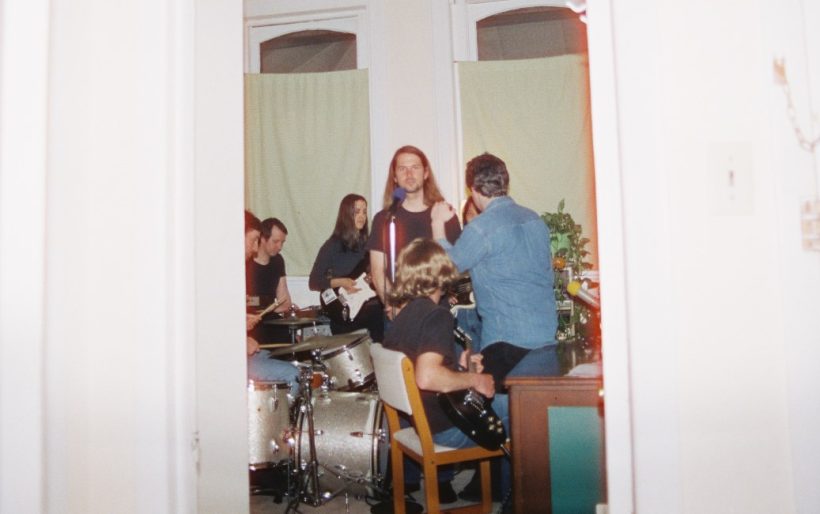TH: I’ve noticed you don’t usually share much information about your music, or explain the meaning behind it, or write out lyrics. Is this part of your artistic vision for Ylayali, leaving things unexplained?
FL: I don’t know, I guess I didn’t realize I really do that. I do definitely like a sense of mystery, certainly. I suppose not sharing lyrics is because I imagine someone listening to the song, and they may even hear a word wrong — and it’s their experience to have — so, the least input and direction I can give somebody to tell them how to digest it and interpret it, the better.
TH: Mike Cormier from Dear Life wrote that Ylayali music is “made to be discovered, rummaged through.” What inspired you to make music like this?
FL: I like that; I don’t know if I would necessarily say that about myself. I do like the idea that this is sort of a lifelong project and I’m just gonna keep outputting material year after year and inevitably some is gonna disappear. There’s a lot of detritus and artifacts to rummage through, so to speak. So I do like that, it does resonate with me.
That was one of my favorite things, in early musical discovery experiences, finding that random-ass MySpace of a band with 10 listens on each one of their songs, or diving deep into various forums on Soulseek and blog spots that were around at the time. I feel like all my favorite stuff was just finding the crappiest recordings possible. The stuff that comes to mind, obviously—or, maybe not obviously—I was big into screamo and emo music, and also making discoveries in metal and grindcore, a lot of solo-person internet grindcore bands. Not necessarily a kind of music that I have made myself, but I take some inspiration from the ethos of: they’re just super into what they do, and they’re gonna go off on their own path and put it out there and hardly anybody’s gonna even see it.
TH: You wrote that your project began as a vehicle for “exorcizing specific, painful, embarrassing or confusing experiences,” and you recalled a phone conversation with your therapist as a key moment on the way to completing Circle Change. Do you feel like your musical approach has some things in common with talk therapy?
FL: I am a big fan of talking about that kind of stuff. Looking back on old songs now, that aren’t necessarily the ones that are online, I’m struck by how specific I am describing specific life events. Not necessarily describing to other people, but for myself trying to conjure these certain events that were in my mind feeling unresolved or emotionally charged. And what I was trying to get at in the most recent album and the couple leading up to it is abstracting that stuff more, where it’s not discussing specific events, but characters in my internal landscape. Those are the things I can interact with instead of trying to deal with a past that I can’t get back to, if that makes any sense. The therapist that I’ve been seeing for a couple years is mostly interested in spirituality and dream work, and the dream work is mostly about dialoguing with these internal characters, or coming to peace or understanding or respect with the thing floating around in the ether of your mind.
TH: How did you come up with the concept of dialoguing with imaginary characters on this album?
FL: I guess the set of characters I was imagining on the album is — there’s the real me, kind of the puppet master, forcing these other two characters to interact; one is this older man, who first occurred in a dream; and one is an imagined version of myself that I can set into these scenes to interact with someone else. And that whole basic idea came right out of the mode of therapy that I was involved in, which is expanding on ideas and images from dreams, either by journaling or by meditating or whatever you want to do, drawing a picture, just thinking about it while you’re doing the dishes, kind of expanding them and seeing where they go. Thinking a second longer about it, it’s just like what everybody does: you know, waking fantasies expand into a whole novel, that’s just using your imagination in the end.
TH: Do you hope for listeners to literally understand the lyrics you sing on Ylayali recordings? Or do you not care whether they understand the words?
FL: I definitely have not cared in the past. Going back to Will Kennedy being my cheerleader, what he has always said is that he wants to hear the words more. So definitely with this new set of songs I tried to be a little clearer, so that somebody might be able to understand what I’m saying. I dunno, I go back and forth on it. On songs where the vocals are a little more buried, it’s more about that texture and melody than what the person is saying, so it almost doesn’t matter what the words are.
Some have just a single vocal, meant to be a little clearer, but I do like to pile the vocal tracks on so I’m thinking of some that are pretty loaded. I like adding effects to my vocals, like autotune or distortion, just as a way to make myself sound different, or it’s just fun to do. [laughs]

